Origin of the Nations of the World
This is a chapter of genealogies, of families, which are the origin of the nations of the world. This chapter is far more important than the space I’m giving to it would indicate.
If you are interested in ethnology and anthropology and the story of mankind on the earth, you may want a far deeper study than you will find here.
Neither the sons of Japheth nor the sons of Ham ever comprised what some folk call the lost ten tribes of Israel. Here in chapter 10 we have the genealogies of all three sons of Noah.
First we see the genealogy of Japheth (vv. 2–5), then the genealogy of Ham (vv. 6–20)—this was the outstanding people at the very beginning and finally the genealogy of Shem (vv. 21–32).
Notice that throughout the Bible God follows this same pattern of giving the rejected line first and saying a word about it, then He drops that subject entirely and does not bring it up again.
Finally, He gives the accepted line, the line which is leading to the Lord Jesus Christ.
Genesis 9 described events that happened between God, Noah, and his three sons after the flood. Genesis 11 will tell the story of the Tower of Babel and the dispersal of the nations.
Between them, Genesis 10 is a table of the nations that come from Japheth, Ham, and Shem after God divides and disperses humanity.
Genesis 10:1 KJV
[1] Now these are the generations of the sons of Noah, Shem, Ham, and Japheth: and unto them were sons born after the flood.
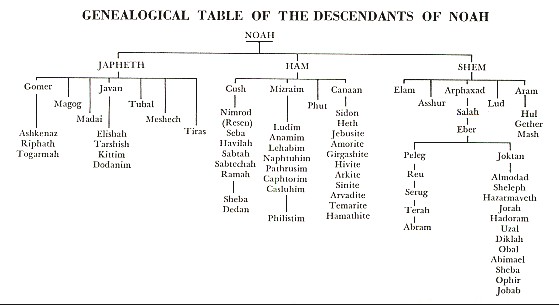
Genesis 10:1
Now these are the generations of the sons of Noah, Shem, Ham, and Japheth: and unto them were sons born after the flood.
Genesis 10 opens and closes with verses that bracket the genealogies between them and reveal their purpose.
Verses 1 and 32 both refer to the chapter as a record of the sons of Noah . . . after the flood, and verse 32 states that these lines of descent and the geographical distribution of the respective clans ultimately produce “nations” (people groups living in specific territories) that Abram and the patriarchs encounter later.
Genesis 10 is sometimes called the table of nations. It describes, in three sections, the peoples that descended from Noah’s sons, Shem, Ham, and Japheth. Japheth’s people settled mostly to the north of what would be Israel.
Ham’s people became great nations in the region of the Middle East, including the people that would settle in the Promised Land before Israel drove them out. Shem’s line would lead to Abraham and the Israelites.
Genesis 10:1–5 details the descendants of Noah’s son, Japheth. Japheth’s sons will largely settle in the regions north of what would later become the nation of Israel.
While some mention is made of these descendants, they will not be directly involved in many biblical events.
Chapter 11 will describe the event that causes the peoples to be dispersed across the world into their separate regions.
The chapter rehearses the genealogies of Noah’s three sons, beginning with Japheth, who seems least influential of the three in history.
Next comes Ham and then Shem, the latter being our next focus.
This verse introduces what is sometimes called the table of nations. In addition to listing some of the descendants of Noah’s sons, the chapter also mentions the lands and nations that formed among these descendants.
This is the purpose God intended for mankind in His commands after the flood: to repopulate the earth (Genesis 9:7). As part of His will, God had promised to never again destroy the earth with a flood (Genesis 9:11).
It’s an awesome thought to realize that the descendants of these individuals became the peoples of the ancient world, the nations that Israel would eventually interact with as a nation themselves.
The incidents of the prior chapter have a drastic impact on these future generations. Since Ham dishonored Noah (Genesis 9:24), his son Canaan was cursed.
The out-workings of that curse will not be clear until many generations later, when Israel arrives in the Promised Land.
The verse is clear that these sons were born to Noah’s three sons after the flood and not before.
SONS OF JAPHETH
You can see that the majority of us in America descended from these lines.
Genesis 10:2-5 KJV
[2] The sons of Japheth; Gomer, and Magog, and Madai, and Javan, and Tubal, and Meshech, and Tiras.
[3] And the sons of Gomer; Ashpenaz, and Riphath, and Togarmah.
[4] And the sons of Javan; Elishah, and Tarshish, Kittim, and Dodanim.
[5] By these were the isles of the Gentiles divided in their lands; every one after his tongue, after their families, in their nations.
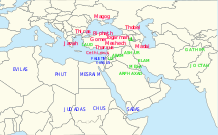
Genesis 10:2
The sons of Japheth; Gomer, and Magog, and Madai, and Javan, and Tubal, and Meshech, and Tiras.
The listing of Japheth’s descendants is briefer than the others. Among the persons and peoples mentioned is Javan, an ancient name for the Greek people. It is thought that many of Japheth’s descendants migrated to Europe.
The first section in chapter 10’s “table of nations” follows the sons of Japheth. Japheth’s descendants mostly settled to the north of the where the nation of Israel would eventually reside.
While the Old Testament prophets sometimes mentioned them, they will not feature greatly in biblical events. Thus, less is said of Japheth’s successors. They were not cursed, in the way that Canaan was (Genesis 9:25).
Nor were they especially blessed, in the way Shem’s descendants led to Abraham and the eventual Messiah, Jesus Christ (Genesis 9:26).
However, the names of Japheth’s seven sons can be correlated with the names and peoples of specific geographic regions in the ancient world, some of whom would intersect with the people of Israel from time to time.
Some of these names would be associated with city-states mentioned later in Scripture, such as Magog (Ezekiel 38:2), Tarshish (Genesis 10:4; Psalm 72:10; Ezekiel 38:13) and Kittim (Genesis 10:4; Numbers 24:24; Daniel 11:30).
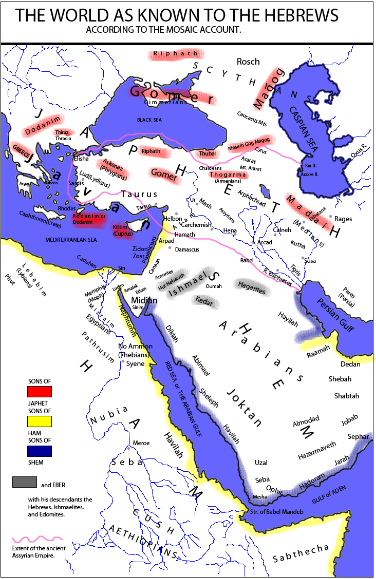
Genesis 10:3
And the sons of Gomer; Ashkenaz, and Riphath, and Togarmah.
The descendants of Gomer came from near the Upper Euphrates region north of the Black Sea.
The descendants of Ashkenaz were the later Scythians who inhabited the region between the Black and Caspian Seas.
Riphath is near Carchemish.
The descendants of Togarmah are associated with Til-garimmu, the capital of Kammanu in modern Armenia.
Chapter 10 is sometimes called the table of nations. In listing the names of the descendants of Noah’s sons, it is also describing the origins of the nations of the ancient world.
The chapter explains the divisions of earth’s ancient tribes according to their family line. Rather than a deep line of fathers and sons, this passage shows a broad spread of brothers and cousins.
The previous verse listed Japheth’s seven sons. This verse lists three sons of Japheth’s son, Gomer. The descendants of these three sons became three tribes who settled to the north of the Promised Land.
These people appear to be the Cimmerians, also known as the Scythians.
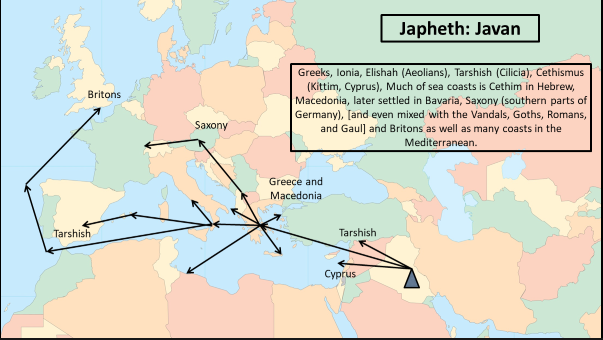
Genesis 10:4
And the sons of Javan; Elishah, and Tarshish, Kittim, and Dodanim.
Elishah is probably Cyprus.
Tarshish is possibly southwest Spain (see note on Jon 1:3).
The Kittim were inhabitants of southern Cyprus.
The Dodanim were inhabitants of the island of Rhodes, later a territory of Greece.
Chapter 10 lists the names of the descendants of Noah’s sons. Rather than tracing a long line of fathers and sons, it shows the wide spread of Noah’s descendants into various tribes.
Accordingly, this passage explains the origins of the nations of the ancient world. The previous verse listed the sons of Japheth’s son Gomer.
This verse lists the sons of Japheth’s son Javan. These four sons are apparently connected to the peoples who would later become the Greeks.
Though Israel would not have many dealings in the Old Testament with the northern peoples who came from Japheth, these names and people do seem to be included in Bible prophecies.
Some of these can be found in Ezekiel chapters 27 and 37—39. Culturally, the Greeks would become profoundly influential and would even conquer the territories of Israel under Alexander the Great.
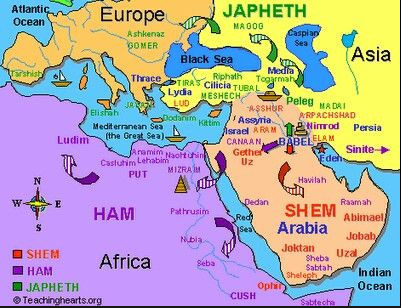
Genesis 10:5
By these were the isles of the Gentiles divided in their lands; every one after his tongue, after their families, in their nations.
seafaring peoples . . . various lands: They settled around the Mediterranean and on various islands.
Language: This occurred after the Tower of Babel episode.
All the ancient world’s nations are described in this passage, according to their descent from Noah. Other genealogies in the Bible follow a chain of fathers and sons deep into history.
This text is broad, showing the various tribes which came from the major descendants of Noah. The previous verses named the sons and grandsons of Japheth.
From Israel’s perspective, the tribes and nations that formed from these men were located, for the most part, to the far north.
Most of these tribes would have little impact on Israel’s history, until their descendants—the Greeks—conquered Israel’s territory under Alexander the Great.
It’s helpful to remember that this spreading out and having separate languages came after the events surrounding the tower of Babel in Genesis 11.
Until that time, all the people of the earth were concentrated in one region and spoke one language.
I hope that you have really enjoyed this post,
Please Leave All Comments in the Comment Box Below ↓













Thank you for sharing this great review of Genesis 10 and reminding the reader of the importance of family and the table of nations.
Anybody who wants to have a fair appraisal of the human family, will benefit from reading this post.
It is interesting to read how the sons of Noah multiplied and had more sons, after the flood and that Genesis 10 starts and concludes with the genealogy of the family.
Hello again as usual,
Thank you for your continued support and all of the comments you have made on any of my websites. My aim is to share the things I am learning with everyone who may be interested.
It is great pleasure to learn that you find THE CALL OF ABRAM – THE SONS OF JAPHETH, HAM, SHEM (G-10-HBS) to be an interesting read.
Continued Blessings Upon You,
Jerry
This study on Genesis 10 from “God in Our Lives Every Day” offers a profound and engaging analysis of this often overlooked chapter.
The author’s passion for understanding and sharing the Word of God is evident, creating an immersive experience for readers. Through providing historical context and thoughtful insights, this study encourages a deeper understanding of the biblical text.
Highly recommended for those seeking to delve into the intricacies of Genesis 10.
Hello Steve,
Thanks for taking the time to stop by and comment on this HBS & DwJ Podcast episode.
I agree with you that it takes passion for understanding and sharing the Word of God. This is not for the weak. It takes strength to realize we are not in control, and we must depend on GOD while choosing to accept Him in our lives.
I am very thankful that you recieve this study as an encouraging, deeper understanding of the biblical text.
Please stop by again,
Blessings My Friend!
Whoo, I am getting all your articles to comment on; it is great. I love it.
Summarizing the Story Blot. Ethnologists and anthropologists need this chapter on genealogies—the origins of countries.
The lost 10 tribes of Israel were not the sons of Japheth or Ham. Instead, Genesis 10 tells the lineage of Noah’s three sons: Japheth (vv. 2–5), Ham (6–20), and Shem (2–32).
God presents rejected lines first, drops them, and then presents the acceptable line, leading to Jesus Christ. Genesis 11 recounts the Tower of Babel and the spread of the nations, whereas Genesis 9 narrates God, Noah, and his sons after the flood.
Genesis 10 lists Japheth, Ham, and Shem’s descendants.
You can feel the passion of the author in the story; it is amazing how the people lived and the way they related to God in there daily lives.
God Bless You always,
Elke
Hello Ingrid,
Thank you for stopping by and showing interest in this HBS & DwJ Platform.
I appreciate you appreciating this episode as great. Thank you so much for your educational and inspirational comments, they add value to the information that is already here. Spiritual Growth is what this platform is all about.
Feel free to listen to the HBS & DwJ Podcast on iHeart, Apple Podcast, YouTube, or where-ever you get your podcast.
Blessings To You, As Well My Friend!
Hi there, Jerry,
Thank you for sharing your knowledge, understanding, and wisdom regarding incorporating God into our lives everyday.
Although I was raised in a Christian home, I needed to find out about God on my own. Once I found clarity about the power of God, I was able to develop my relationship with Him.
As I have grown closer to God, it has become evident that God is present in every facet of my life. He guides and protects me through all of the trials and tribulations that come my way.
Rachele
Hello Elke,
Thank you for your comment on this HBS & DwJ Podcast episode.
You are most certainly welcome for the sharing of knowledge, understanding, and wisdom.
Yes, GOD is our Everthing!
Blessings My Friend!
Hello!
I’ve been exploring various topics to expand my knowledge, and I stumbled upon your article about the genealogies and origins of different nations in the world. This is a subject that I’m not very familiar with, but it seems to be quite significant in understanding the history of different cultures and societies.
I noticed that the article talks about the genealogies of Noah’s three sons: Japheth, Ham, and Shem, and how their descendants contributed to the formation of various nations. It’s fascinating to think about how these genealogies play a role in the interactions between different groups of people throughout history.
I’m curious to know more about the significance of these genealogies and how they connect to the broader context of human history.
Could you explain why these genealogies are important and how they influence the development of different nations and cultures?
Thank you!
Hello skamalka,
Thanks again for stopping by the HBS & DwJ website, turned podcast.
Family lists and genealogies are a prominent part of 1st and 2nd Chronicles, and other Old Testament books. These genealogies were obviously important to Israel, and the Jews kept meticulous records.
One reason family history was important to Israel is that it proved one’s identity as a Jew, a partaker of the blessings of Abraham, Isaac, and Jacob and part of the people chosen by God. If a person was not a Jew, he or she could not truly be a Jewish citizen and participate in all of the aspects of Jewish life and culture.
Family history was also important due to where one lived. Each of the Jewish tribes had received a land inheritance in Israel. For a person to inherit land in a particular tribal area required evidence that he was descended from that particular tribe.
Genealogies were essential to proving whether a Jewish male could serve in the Levitical priesthood. Priests could only be from the tribe of Levi and descendants of Aaron, the brother of Moses. If a man could not prove this connection, he was unable to serve as a priest.
A family’s history could also show an affiliation with people of significance.
Thank you again for your continued support with helping HBS & DwJ spread GOD’s Word.
Blessings To You Always My Friend!